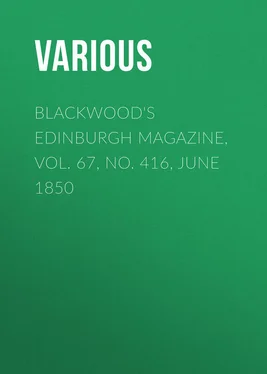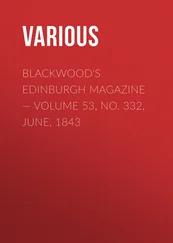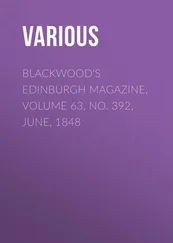Various - Blackwood's Edinburgh Magazine, Vol. 67, No. 416, June 1850
Здесь есть возможность читать онлайн «Various - Blackwood's Edinburgh Magazine, Vol. 67, No. 416, June 1850» — ознакомительный отрывок электронной книги совершенно бесплатно, а после прочтения отрывка купить полную версию. В некоторых случаях можно слушать аудио, скачать через торрент в формате fb2 и присутствует краткое содержание. Издательство: Иностранный паблик, Жанр: periodic, foreign_edu, Путешествия и география, на английском языке. Описание произведения, (предисловие) а так же отзывы посетителей доступны на портале библиотеки ЛибКат.
- Название:Blackwood's Edinburgh Magazine, Vol. 67, No. 416, June 1850
- Автор:
- Издательство:Иностранный паблик
- Жанр:
- Год:неизвестен
- ISBN:нет данных
- Рейтинг книги:5 / 5. Голосов: 1
-
Избранное:Добавить в избранное
- Отзывы:
-
Ваша оценка:
- 100
- 1
- 2
- 3
- 4
- 5
Blackwood's Edinburgh Magazine, Vol. 67, No. 416, June 1850: краткое содержание, описание и аннотация
Предлагаем к чтению аннотацию, описание, краткое содержание или предисловие (зависит от того, что написал сам автор книги «Blackwood's Edinburgh Magazine, Vol. 67, No. 416, June 1850»). Если вы не нашли необходимую информацию о книге — напишите в комментариях, мы постараемся отыскать её.
Blackwood's Edinburgh Magazine, Vol. 67, No. 416, June 1850 — читать онлайн ознакомительный отрывок
Ниже представлен текст книги, разбитый по страницам. Система сохранения места последней прочитанной страницы, позволяет с удобством читать онлайн бесплатно книгу «Blackwood's Edinburgh Magazine, Vol. 67, No. 416, June 1850», без необходимости каждый раз заново искать на чём Вы остановились. Поставьте закладку, и сможете в любой момент перейти на страницу, на которой закончили чтение.
Интервал:
Закладка:
One other sham, perhaps the greatest which our age has witnessed, Mr Carlyle accidentally denounces – we mean the late Colonial policy. If the Whigs have an official aptitude for anything, it is the coopering up of Constitutions. Is one colony indignant at some outrage or insult proceeding from headquarters – is another dissatisfied with the conduct of the Governor, and urgent for his recall – is a third aggrieved by the commercial vacillation and fiscal measures of a Parliament in which it has neither voice nor power – the universal panacea is, Give them a Constitution! We hope the present Ministry will profit by the following criticism – not volunteered by us, who neither look upon them with affection, nor entertain any sanguine hope of their conversion to a patriotic policy, – but penned by a writer who, not long ago, was considered by their organs as one of the deepest thinkers of the age.
"Constitutions for the Colonies," says Mr Carlyle, "are now on the anvil; the discontented Colonies are all to be cured of their miseries by Constitutions. Whether that will cure their miseries, or only operate as a Godfrey's Cordial to stop their whimpering, and in the end worsen all their miseries, may be a sad doubt to us. One thing strikes a remote spectator in these Colonial questions: the singular placidity with which the British Statesman at this time, backed by M'Crowdy and the British moneyed classes, is prepared to surrender whatsoever interest Britain, as foundress of those establishments, might pretend to have in the decision. 'If you want to go from us, go; we by no means want you to stay: you cost us money yearly, which is scarce; desperate quantities of trouble too: why not go, if you wish it?' Such is the humour of the British Statesman at this time. – Men clear for rebellion, 'annexation' as they call it, walk openly abroad in our American Colonies; found newspapers, hold platform palaverings. From Canada there comes duly by each mail a regular statistic of Annexationism: increasing fast in this quarter, diminishing in that; – Majesty's Chief Governor seeming to take it as a perfectly open question; Majesty's Chief Governor, in fact, seldom appearing on the scene at all, except to receive the impact of a few rotten eggs on occasion, and then duck in again to his private contemplations. And yet one would think the Majesty's Chief Governor ought to have a kind of interest in the thing? Public liberty is carried to a great length in some portion of her Majesty's dominions. But the question, 'Are we to continue subjects of her Majesty, or start rebelling against her? So many as are here for rebelling, hold up your hands!' Here is a public discussion of a very extraordinary nature to be going on under the nose of a Governor of Canada? How the Governor of Canada, being a British piece of flesh and blood, and not a Canadian lumber-log of mere pine and rosin, can stand it, is not very conceivable at first view. He does it, seemingly, with the stoicism of a Zeno. It is a constitutional sight like few."
With Earl Grey at the head of the Colonial Department, backed and assisted by that pattern of candour, Mr Hawes – with Lord Elgin in Canada, and Lord Torrington in Ceylon – the integrity of the British empire is certainly exposed to peril. But a more dangerous symptom is the spirit which of late years has prevailed in the councils of the nation, and owes its origin to the false views and perverse unpatriotic doctrines of the political economists. They refuse to admit into their calculations any element which may not be reduced to the standard of money-value, and they consider that the worth of a colony is to be measured solely by the returns of its traffic. This is a leading dogma of Free Trade; and no doubt, were Free Trade capable of entire realisation, if the nations of the earth had no other ambition than to buy and sell, after the manner recommended by Mr Cobden, and if reciprocity were a thing universal, a good deal might be urged in its favour. If we apply the same test to Ireland, we shall find that it is greatly for the advantage of the people of Great Britain to pronounce in favour of Repeal, and to allow the young patriots of the Emerald Isle to enter into any kind of relationship which they may choose with the sympathising republicans of France. This is Free Trade in its plain, undisguised form; and to some such consummation as this we must come at last, by virtue of the grand experiment, should that, like Sir Robert Peel's temporary Income Tax, be extended to a limitless perpetuity. At present, in so far as regards the welfare of a great portion of the inhabitants of the country, it is difficult to perceive what advantage they derive from the boasted character of Britons, except the privilege of contributing to the heaviest load of taxation that was ever laid upon the industry of a people. We acknowledge that the Free-traders have planned their scheme with consummate adroitness and dexterity. If their object was, as we believe it was, to sap those principles of high morality, rectitude, honour, and patriotism, which carried Great Britain successfully through the dangers of wild European revolution, anarchy, and war, they could not have hit upon a better or a surer method. Many a disheartened agriculturist has lately asked himself, what is the nature of the ties which bind him imperatively to Britain, when a richer soil and a fairer climate can be found elsewhere, a home not daily harassed by the knock of the tax-gatherer, and the London market ever ready to receive the product of his industry? It is not good that these questions should arise in the minds of our yeomen, for they are calculated to engender a train of thoughts very hostile to the maintenance of that credit which England dare not lose, without forfeiting her reputation, her fame, her honour, and her sway. The thoughts of the colonies have long been bent in a similar direction; and we doubt not that many of them have been amazed to find that, so far from being checked in their preliminary mutterings of revolt, they have the hearty good wishes of the Manchester men in dissolving their connection with the mother country, whenever they may choose to do so. Thus do we stand at present in our home and colonial relations, the clank of the constitution hammer resounding from the cooperage, and dull-eyed Imbecility sitting lazily at the helm.
We must now take our leave of Mr Carlyle, sincerely regretting that we cannot, with any degree of truth, congratulate him either on the tone or the character of his late lucubrations. These pamphlets, take them altogether, are about the silliest productions of the day; and we could well wish, for his sake, that they had never been compiled. Very few people, we imagine, will be disposed to wait with confidence for the avatar of his Noblest and Noblers, such as he has depicted them. Our faith and hopes lie in a different direction; nor have we any wish to see a Cromwell at the head of affairs, supported by a staff of noble young souls, poetical or otherwise, who require to be bought over for the purpose. Towards the close of his fourth pamphlet, our author lets drop a hint from which we gather that it is not impossible that his Noblest may hereafter appear embodied in the person of Sir Robert Peel. All we shall say on that score is, that Sir Robert has already had sufficient opportunity vouchsafed him to exhibit the extent of his qualifications. It is not likely that the Statesman who, in the eve of life, and enjoying the undiminished confidence of his Sovereign, finds himself in the House of Commons without the semblance of a party to support him, can ever make another desperate rally. It would be difficult to find in the annals of history any instance of a leading politician who has been so often trusted, and impossible to find one who has so often abused that trust. Even Mr Carlyle cannot deny the Unveracities of which Sir Robert stands convicted; and although he appears to think that lapses from truth are of so common occurrence as to be venial, we beg to assure him that his opinion is not the general one, nor is it altogether creditable to the morality of the man who ventures to express it. We are sorry to observe that, in the conclusion of this latter tract, Mr Carlyle has condescended to borrow some hints from that most eminent master of modern scurrility, the late Daniel O'Connell. This is, in every respect, to be deplored. Wit is not Mr Carlyle's forte, and this kind of wit, if wit it be, is, when served up at second hand, both nauseous and revolting. At a calmer moment, and on more mature reflection, we feel convinced that Mr Carlyle will blush for the terms which he has allowed himself to apply to so eminent a genius as Mr Disraeli; and that he will in future abstain from testifying his gratitude for a humiliating invitation to dinner in a shape so abject as that of casting personal and low abuse upon the political adversaries of his entertainer.
Читать дальшеИнтервал:
Закладка:
Похожие книги на «Blackwood's Edinburgh Magazine, Vol. 67, No. 416, June 1850»
Представляем Вашему вниманию похожие книги на «Blackwood's Edinburgh Magazine, Vol. 67, No. 416, June 1850» списком для выбора. Мы отобрали схожую по названию и смыслу литературу в надежде предоставить читателям больше вариантов отыскать новые, интересные, ещё непрочитанные произведения.
Обсуждение, отзывы о книге «Blackwood's Edinburgh Magazine, Vol. 67, No. 416, June 1850» и просто собственные мнения читателей. Оставьте ваши комментарии, напишите, что Вы думаете о произведении, его смысле или главных героях. Укажите что конкретно понравилось, а что нет, и почему Вы так считаете.












